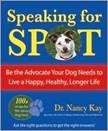Dogs and Mushrooms: A Potentially Lethal Mix
by Nancy Kay, DVM
I remember the sad sinking feeling I experienced last August as I read an email from my friend Diana Gerba. Seeing her email in my inbox initially prompted excitement- oh goodie, more photos and stories about Donato, Diana's adorable Bernese Mountain Dog. My excitement quickly morphed into utter disbelief as Diana described the death of her barely six-month-old pup caused by ingestion of a poisonous mushroom.
Diana's heart was broken. As she wrote in her email,
Every region of the country is different in terms of mushroom flora. Where I live in northern California, Amanita phalloides (aka Death Cap) is the most common poisonous species and grows year round particularly in soil surrounding oak trees. Ingestion of a Death Cap mushroom causes liver failure (in people and in dogs)- makes sense given the liver's function as the "garbage disposal" of the body. Symptoms typically include vomiting, diarrhea, lethargy, loss of appetite, delayed blood clotting, and neurological abnormalities. Every year at my busy hospital, we see at least a handful of dogs with liver failure clearly caused by mushroom ingestion. In spite our very best efforts, the individuals who survive mushroom poisoning are few and far between. Affected people can receive a liver transplant; no such technology available (yet) for dogs.
To learn more about poisonous mushrooms visit the North American Mycological Association and Bay Area Mycological Society websites. If you suspect your dog has ingested a mushroom get to your veterinary clinic or the closest emergency care facility immediately (choose whichever is most quickly accessible). If possible, take along a sample of the mushroom so it can be professionally identified if need be.
Fortunately, my friend Diana has managed to put a positive spin on the loss of her beloved Donato. Not only does she have Tesoro, a new little Berner boy in her life, she has made it her personal mission to warn people about the potential hazards of mushroom toxicity in dogs. She created the attached flyer (see above). Feel free to download and post it wherever dog loving people congregate. Diana sent a blast email out just a few days ago after finding a Death Cap mushroom in her yard. Coincidentally, today I discovered several mushrooms on my property while beginning the task of weeding my garden. They're gone now, but given our current weather pattern, I'm quite sure there will be more tomorrow.
What can you do to prevent your dog from ingesting a poisonous mushroom? Clear any mushrooms from your dog's immediate surroundings, and be super vigilant on your walks, particularly if you have a pup (youngsters love to put anything and everything in their mouths) or an adult dog who is a known indiscriminate eater. Learn more about which poisonous mushrooms grow in your area and what they look like. And please remember, if you see your dog ingest a mushroom- get yourselves to a veterinary hospital as quickly as possible (even if it is after hours). Ingestion of even a nibble of a toxic mushroom is life threatening, and the sooner treatment is started the greater the likelihood of saving your best buddy.
Are you aware of poisonous mushrooms in your neck of the woods? If so, please share where you live (city and state) and the name of the mushroom if you happen to know it.
CREDIT:
Dr. Nancy Kay, DVM Diplomate, American College of Veterinary Internal Medicine.
Recipient, American Animal Hospital Association 2009 Animal Welfare and Humane Ethics Award Recipient, 2009 Dog Writers Association of America Award for Best Blog Recipient, 2009 Eukanuba Canine Health Award
 Author of Speaking for Spot: Be the Advocate Your Dog Needs to Live a Happy, Healthy, Longer Life
Author of Speaking for Spot: Be the Advocate Your Dog Needs to Live a Happy, Healthy, Longer Life
Website: http://speakingforspot.com
Spot’s Blog: "http://www.speakingforspot.com/blog
Email: dr.kay@speakingforspot.com
Become a Facebook Fan: Facebook Fan - Nancy-Kay
I remember the sad sinking feeling I experienced last August as I read an email from my friend Diana Gerba. Seeing her email in my inbox initially prompted excitement- oh goodie, more photos and stories about Donato, Diana's adorable Bernese Mountain Dog. My excitement quickly morphed into utter disbelief as Diana described the death of her barely six-month-old pup caused by ingestion of a poisonous mushroom.
Diana's heart was broken. As she wrote in her email,
A special boy, Donato was a silver tipped puppy, a rarity in our breed. With his tail always wagging, he had boundless enthusiasm for life. He was a happy little chap and was my joy. He loved me and I him. We were a team ordained by the stars.
Every region of the country is different in terms of mushroom flora. Where I live in northern California, Amanita phalloides (aka Death Cap) is the most common poisonous species and grows year round particularly in soil surrounding oak trees. Ingestion of a Death Cap mushroom causes liver failure (in people and in dogs)- makes sense given the liver's function as the "garbage disposal" of the body. Symptoms typically include vomiting, diarrhea, lethargy, loss of appetite, delayed blood clotting, and neurological abnormalities. Every year at my busy hospital, we see at least a handful of dogs with liver failure clearly caused by mushroom ingestion. In spite our very best efforts, the individuals who survive mushroom poisoning are few and far between. Affected people can receive a liver transplant; no such technology available (yet) for dogs.
To learn more about poisonous mushrooms visit the North American Mycological Association and Bay Area Mycological Society websites. If you suspect your dog has ingested a mushroom get to your veterinary clinic or the closest emergency care facility immediately (choose whichever is most quickly accessible). If possible, take along a sample of the mushroom so it can be professionally identified if need be.
Fortunately, my friend Diana has managed to put a positive spin on the loss of her beloved Donato. Not only does she have Tesoro, a new little Berner boy in her life, she has made it her personal mission to warn people about the potential hazards of mushroom toxicity in dogs. She created the attached flyer (see above). Feel free to download and post it wherever dog loving people congregate. Diana sent a blast email out just a few days ago after finding a Death Cap mushroom in her yard. Coincidentally, today I discovered several mushrooms on my property while beginning the task of weeding my garden. They're gone now, but given our current weather pattern, I'm quite sure there will be more tomorrow.
What can you do to prevent your dog from ingesting a poisonous mushroom? Clear any mushrooms from your dog's immediate surroundings, and be super vigilant on your walks, particularly if you have a pup (youngsters love to put anything and everything in their mouths) or an adult dog who is a known indiscriminate eater. Learn more about which poisonous mushrooms grow in your area and what they look like. And please remember, if you see your dog ingest a mushroom- get yourselves to a veterinary hospital as quickly as possible (even if it is after hours). Ingestion of even a nibble of a toxic mushroom is life threatening, and the sooner treatment is started the greater the likelihood of saving your best buddy.
Are you aware of poisonous mushrooms in your neck of the woods? If so, please share where you live (city and state) and the name of the mushroom if you happen to know it.
CREDIT:
Dr. Nancy Kay, DVM Diplomate, American College of Veterinary Internal Medicine.
Recipient, American Animal Hospital Association 2009 Animal Welfare and Humane Ethics Award Recipient, 2009 Dog Writers Association of America Award for Best Blog Recipient, 2009 Eukanuba Canine Health Award
 Author of Speaking for Spot: Be the Advocate Your Dog Needs to Live a Happy, Healthy, Longer Life
Author of Speaking for Spot: Be the Advocate Your Dog Needs to Live a Happy, Healthy, Longer LifeWebsite: http://speakingforspot.com
Spot’s Blog: "http://www.speakingforspot.com/blog
Email: dr.kay@speakingforspot.com
Become a Facebook Fan: Facebook Fan - Nancy-Kay
